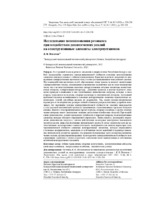Исследование возникновения резонанса при воздействии динамических усилий на конструктивные элементы электроустановок
Another Title
A Study of the Occurrence of Resonance under the Influence of Dynamic Forces on the Structural Elements of Electrical Installations
Bibliographic entry
Потачиц, Я. В. Исследование возникновения резонанса при воздействии динамических усилий на конструктивные элементы электроустановок = A Study of the Occurrence of Resonance under the Influence of Dynamic Forces on the Structural Elements of Electrical Installations / Я. В. Потачиц // Энергетика. Известия высших учебных заведений и энергетических объединений СНГ. – 2021. – № 3. – С. 228-238.
Abstract
Рост уровней токов короткого замыкания в энергосистеме Республики Беларусь тре-бует исследования параметров электродинамической стойкости основных конструктивных элементов электроустановок с гибкими проводниками. В режиме короткого замыкания по про-водникам электроустановок протекают токи, в сотни раз превышающие токи рабочего режима. При взаимодействии магнитных полей, образованных этими токами, возникают значительные электромагнитные усилия, оказывающие разрушающее воздействие как на сами токоведущие части, так и на конструктивные элементы электроустановок: опорные изоляторы, коммутаци-онные аппараты, измерительную аппаратуру. Движение проводов в режиме короткого замы-кания приводит к появлению в них существенных динамических нагрузок, которые, в свою очередь, передаются на порталы, опорные изоляторы и электрические аппараты. Актуальной проблемой является возникновение в основных конструктивных элементах недопустимых ме-ханических усилий, способных вызвать их разрушение. Так, анализ физико-механических параметров и геометрических размеров гибкой ошиновки распределительных устройств пока-зывает, что нарушение условия электродинамической стойкости по тяжению маловероятно в силу высокой механической прочности применяемых сталеалюминевых проводов большого сечения. Вместе с тем ограничивающие пролет порталы, опорные изоляторы и другие электри-ческие аппараты имеют значительно меньшие допустимые изгибающие нагрузки. При воздей-ствии динамических усилий проводники изгибаются и передают нагрузку на конструктивные элементы, которые обладают определенной упругостью. Таким образом, достоверное опреде-ление динамических нагрузок с учетом действующих на опорные конструкции токоведущих частей возможно лишь при постановке динамической задачи. В статье излагаются методы ма-тематического моделирования и вычислительного эксперимента для анализа параметров элек-тродинамической стойкости основных конструктивных элементов, которые определяются с помощью коэффициентов, зависящих от собственных частот колебаний и характера измене-ния динамических усилий во времени. Для решения поставленных задач составлены математи-ческие модели, сформулированы краевые задачи расчета электродинамической стойкости кон-структивных элементов с учетом вероятного совпадения частот вынужденных и собственных колебаний конструктивных элементов.
Abstract in another language
The increase in the levels of short-circuit currents in the power system of the Republic of Belarus requires the study of the parameters of the electrodynamic stability of the main struc- tural elements of electrical installations with flexible conductors. In case of a short circuit in the network, currents tenfold exceeding the rated one hundreds of times can flow through the current-carrying part of the device. When the magnetic fields formed by these currents interact, significant electromagnetic forces arise, which have a destructive effect both on the current-carrying parts themselves and on the structural elements of electrical installations, viz. support insulators, swit- ching devices, measuring equipment. The movement of the wires in a short-circuit mode leads to the appearance of significant dynamic loads in them, which, in turn, are transmitted to the portals, support insulators and electrical devices. A topical problem is the occurrence of unacceptable mechanical forces in the main structural elements that can cause their destruction. Thus, the analy-sis of the physical and mechanical parameters and geometric dimensions of the flexible busbar of switchgear shows that a violation of the condition of electrodynamic resistance to tension is unlikely due to the high mechanical strength of the large-section steel-aluminum wires used. At the same time, span-limiting portals, support insulators and other electrical devices have signi- ficantly lower permissible bending loads. When exposed to dynamic forces, the conductors bend and transfer the load to the structural elements which have certain elasticity. Thus, a reliable determination of dynamic loads, taking into account the current-carrying parts acting on the sup-porting structures, is possible only if a dynamic task is set. The article describes the methods of mathematical modeling and computational experiment for analyzing the parameters of the electro-dynamic stability of the main structural elements which are determined using coefficients that depend on the natural frequencies of oscillations and the nature of changes in dynamic forces over time. To solve these problems, mathematical models are compiled and boundary value prob-lems are formulated for calculating the electrodynamic stability of structural elements, taking into account the possible coincidence of the frequencies of natural and forced oscillations of structural elements taking into account the probable coincidence of the frequencies of forced and natural vibrations of structural elements.
View/
Collections
- № 3[8]

